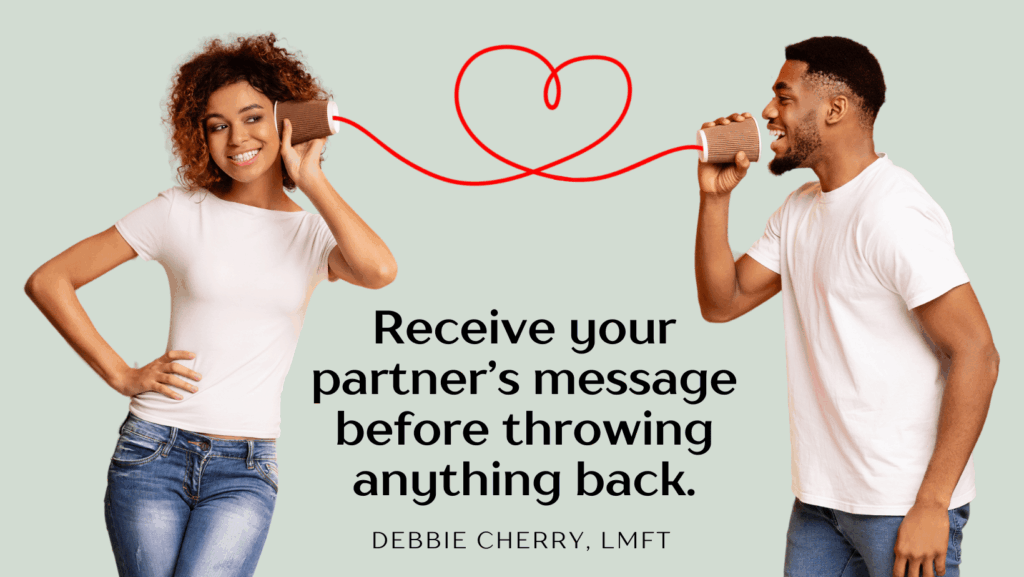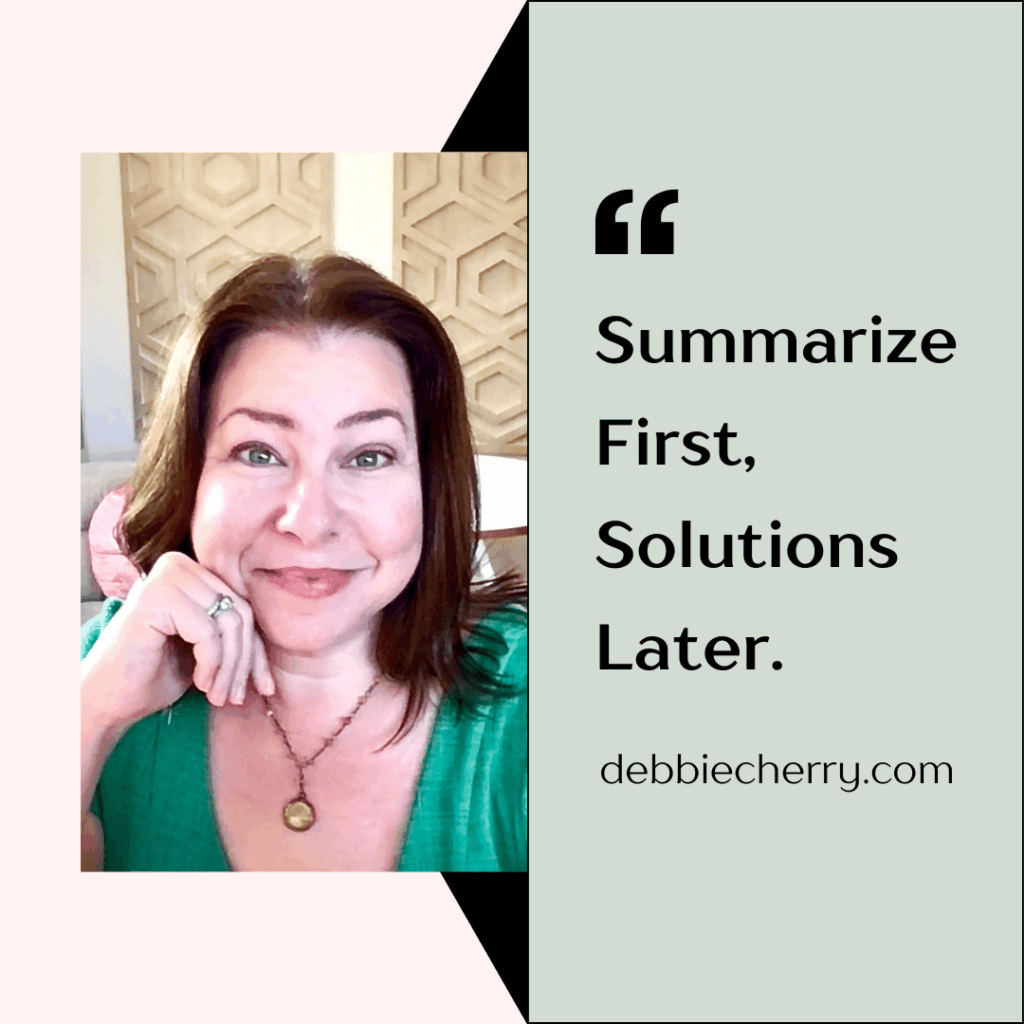Why Couples Communication Breaks Down
You used to talk for hours. Now, you keep having the same fight on repeat. The never-ending dishes debates, missed texts, and tone-of-voice issues are starting to pile up. You feel so far apart.
Feeling unseen by the person who is supposed to get you the most is deeply troubling. Your nervous system kicks into overdrive, and effective communication goes out the window.
Instead of hearing your partner, you’re caught in a whirlwind of assumptions and automatic defenses. The more you try to be heard, the more disconnected you both feel. You might get louder, argue harder, or shut down completely. You’re stuck in a painful cycle.
You Are Trying To Solve The Wrong Problem
You might think you’re fighting about chores or schedules… but the reality is that even the happiest couples can’t fix nearly 70% of their recurring problems, as found in the Gottmans’ research.
What makes or breaks couples is the way you talk to each other when your differences in personality, perceptions, needs, history, or temperament create inevitable relationship tension.
The real issue is the disconnection.
Successful couplehood starts with a secure base. The whole name of the game is for each partner to focus on their side of the street… because the biggest bang for your buck is in lowering your OWN defenses so you can be a good partner, especially when you disagree or feel triggered.
It’s not about who’s right… it’s about feeling seen and safe.

Summarize To Stop The Disconnection Spiral
Feelings of abandonment trigger your brain’s fight-or-flight response, shutting down the parts that make empathy, reasoning, and compassion possible. This is why in heated moments you might:
- Misinterpret your partner’s tone
- Forget the main point you were trying to make
- Lead with criticism instead of compassion
- Say things you regret later
Healthy relationship communication is impossible when primal defenses take over. Your brain prioritizes protection over connection. You become opponents, rather than partners.
Summarizing first brings you back to the same side of the table.
Why Feeling Heard Matters
Attachment is the heartbeat of intimate relationships. When your connection feels shaky, everyday conversations can turn into struggles to be seen. As soon as you sense “They don’t get me,” your nervous system sounds the alarm.
Feeling unheard feels like a threat to your survival. From the moment we’re born, our well-being depends on caregivers noticing us, understanding us, and meeting our needs. That same wiring follows us into adulthood.
In survival mode… your brain protects, not connects.
Empathy? Gone. Listening? Impossible.
Until you feel seen & safe, you can’t communicate.
Reflect Before You React
Even couples who deeply love each other struggle to break the cycle of miscommunication, defensiveness, and disconnect.
But there’s one shift that changes everything: reflect before you react.
Instead of rushing to defend or fix, take a moment to truly listen. Summarize what your partner is saying. That small moment of reflection breaks the spiral and builds connection.
It’s about being SEEN.
Summarize First.

Summarizing Is The Shortcut to Connection
Before explaining yourself, defending your actions, or trying to solve the surface-level problem… pause, and REPEAT back what you’re hearing.
Reflective listening creates a respectful climate where feelings land and connection grows. You can hold your perspective, and still offer a safe space that helps both partners feel understood.
Slow down… Don’t rush to counter their points. Paraphrase what you hear to prioritize connection over protection.
Become better listeners so you both feel heard. If you want to communicate effectively, you have to connect before you correct, convince or critique.
Couples Communication Works Like Playing Catch
Think of conversations like playing catch. RECEIVE the message before tossing yours back.
Repeat back what your partner says so you stay connected rather than defensive.
Instead of letting your mind run with old stories like “Here we go again” or “That’s not true,”… pause.
Take a deep breath, and change the negative patterns pushing you apart. Catch your partner’s feelings first, rather than reacting or even responding.
Why Listening Works:
It calms the nervous system.
It shows your partner they matter.
It keeps you from reacting.
It brings you back to the same team.
Get Back On The Same Page With Reflective Listening
The biggest threat to SEEING each other are your own defenses. The most powerful thing you can do to improve your relationship is to become amazing at stopping your defenses in their tracks.
❝ Reflecting is like putting your brain in neutral.❞
We think 10 times faster than we listen. So, while your partner is talking, your mind is already racing with defenses, fixes, or “what about me?” It’s like their words are a quiet podcast, but your head is blasting your own loud soundtrack, drowning them out.
Summarizing helps your partner feel heard. It helps you understand what was said. Since we only recall less than 20% of what we hear, saying it back really matters.
✅ Download the free Summarize Reminders with tips & scripts (instant access, no email needed).
🌟 Understanding fuels connection. Copy the link to share the tiny tweak that changes everything:
➪ www.debbiecherry.com/transform-couples-communication
Summarizing Does 3 Big Things For Couples Communication Patterns:
- Keeps You Connected: You’re not just waiting to defend. You are a team.
- Reduces Misunderstandings: When people feel heard, they can actually listen.
- Cools Conflict Quickly: Reflecting slows the stress response, so conversations don’t spiral into arguments.
Relationship research shows that simply slowing down to connect with your partner’s perspective cuts relationship problems by 50%.
Before You React, Try This…
Words To Connect:
“I hear that you’re feeling disconnected.”
“I hear you’re upset I was late.”
“I hear you needed more from me today.”
“I hear you’re hurt I didn’t check in.”
“I hear you’re tired of doing it alone.”
Healthy Communication Starts with Better Listening
The first three minutes of a conversation predict how the rest of the talk will go with 96% accuracy. So, actively listen at the beginning of your dialogue with your partner because that’s when it matters most.
You don’t have to figure out who’s right or unpack every trigger to improve communication in romantic relationships. You just have to let your partner know: You’re not alone.
When your heart’s racing and your mind is ready to react, Pause. Summarize & empathize to stop the pattern of defensiveness. The next thing you know, you’re plotting a date night, not sulking in separate rooms.
Summarize before you defend.
keep connecting,
Debbie Cherry, LMFT
READY TO GET BACK ON THE SAME PAGE?
💝 Grab the free Connected Communication Toolkit to stop arguments and rebuild connection with a simple framework.
📅 Book an appointment for a free consultation or a session to help make these research-based habits stick.
💬 Frequently Asked Questions About Couples Communication:
Why is listening so hard in relationships?
Listening is hard in relationships because our minds race and defenses jump in. Reflective listening means repeating back what your partner said before adding your response. It helps you stay present so the other’s feelings feel validated and hurt feelings don’t escalate. Seeing the moment through your partner’s eyes builds listening skills and supports healthy couples communication. This simple, constructive way creates space to connect at a deeper level, read body language, problem solve more calmly, and move toward better communication, relationship satisfaction, and marital satisfaction over time.
How can I help my partner feel heard?
Use reflective listening to acknowledge the other’s feelings and respond from your partner’s eyes before you add your view. Keep your tone open and honest, summarize what makes sense. Pay attention to non verbal cues like tone, eye contact, posture, and facial expressions. When we feel threatened, in a bad mood, or misunderstood, our ability to reflect, empathize, and respond shuts down. If emotions spike, pause and choose a specified time to return. Taking a time out to reset emotionally can help you come back with a clearer, calmer mindset, especially in moments of poor communication between one partner and the other. Try to see the situation through your partner’s perspective, and respond from the other’s perspective, not just your own. These small shifts reduce relationship issues, help couples communicate effectively and strengthen your emotional bond.
How does couples therapy help communication skills in relationships?
A couples therapist offers a communication strategy and practice reps (e.g., reflective listening, naming needs) that surface underlying issues and unmet need without shaming the other partner. Sessions focus on speaking in an open and honest tone, so you both feel heard. Modalities like Imago Relationship Therapy create a safe space for deeper emotional intimacy and healing power through connection. A couples therapist can help both partners learn to actively listen, express feelings constructively, and resolve misunderstandings without blame or shame. Positive language exercises can help create deeper understanding of each other’s needs. Marriage counseling teaches communication skills and provides custom communication exercises like reflective listening, eye contact and assertive communication using positive statements. These practical exercises often help partners clarify their own feelings while learning to stay open during meaningful conversations.
📚 Healthy Couples Communication Resources & References:
- Attachment Styles & Communication : Research shows how security or insecurity shapes healthy couples communication, affects conflict resolution, and helps partners stay present with the other’s feelings. Understanding these patterns clarifies underlying issues, supports relationship change at a deeper level, and offers a constructive way to see through your partner’s eyes so joint decisions feel more possible and partners feel satisfied.
- Gottman Couples Conflict Research (Carrère & Gottman, 1999) : Known for the “first three minutes” insight, this work guides a practical communication strategy: lead with listening skills to lower hurt feelings and improve conflict resolution. Applying these findings supports better communication in daily talks and is linked with higher relationship satisfaction and marital satisfaction.
- International Listening Association : These data shows we think 10x faster than we listen (average listening rate of 125-250 WPM vs. 1,000–3,000 WPM thinking speed), which is why summarizing helps you stay present and respond in a constructive way. Slowing down improves listening skills, helps you problem solve without blame, and is a cornerstone of becoming a great communicator in close relationships.
- Psychology Department Labs on How We Remember Conversations: Listeners remember about half right away and around 20% a day later (Hargie). In conversation studies, detailed recall is often 0–20% after short delays – so saying it back helps both of you feel heard.
- “5-Second Rule” Helps Diffuse Arguments Between Couples: Business Insider summary of the same University of St Andrews study highlighting the real-world impact of brief conflict de-escalation.


